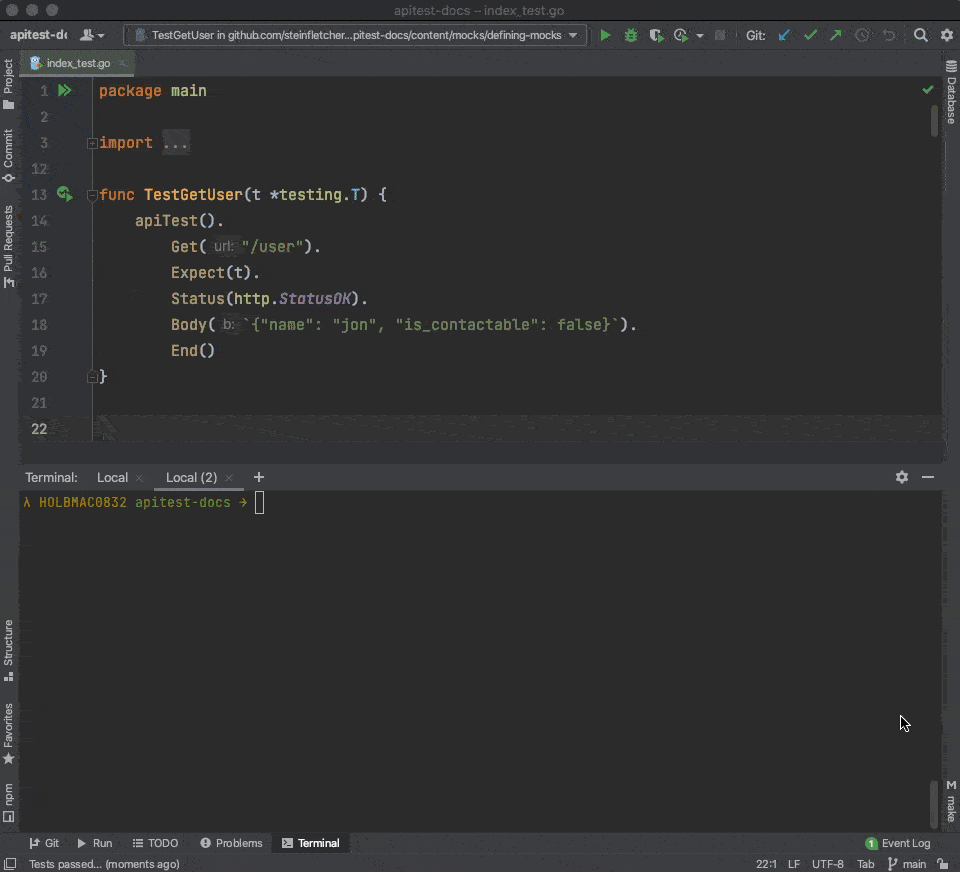A simple and extensible behavioural testing library. Supports mocking external http calls and renders sequence diagrams on completion.
In behavioural tests the internal structure of the app is not known by the tests. Data is input to the system and the outputs are expected to meet certain conditions.
Join the conversation at #apitest on https://gophers.slack.com.
Logo by @egonelbre
Note: The API for apitest is stable and complete - despite the lack of activity this repository is still actively maintained. Any new issues will be addressed. Feature requests will be considered.
Please visit https://apitest.dev for the latest documentation.
go get -u github.com/steinfletcher/apitest| Example | Comment |
|---|---|
| gin | popular martini-like web framework |
| graphql | using gqlgen.com to generate a graphql server |
| gorilla | the gorilla web toolkit |
| iris | iris web framework |
| echo | High performance, extensible, minimalist Go web framework |
| fiber | Express inspired web framework written in Go |
| httprouter | High performance HTTP request router that scales well |
| mocks | example mocking out external http calls |
| sequence diagrams | generate sequence diagrams from tests. See the demo |
| Ginkgo | Ginkgo BDD test framework |
| Library | Comment |
|---|---|
| JSONPath | JSONPath assertion addons |
| CSS Selectors | CSS selector assertion addons |
| PlantUML | Export sequence diagrams as plantUML |
| DynamoDB | Add DynamoDB interactions to sequence diagrams |
This library was influenced by the following software packages:
- YatSpec for creating sequence diagrams from tests
- MockMVC and superagent for the concept and behavioural testing approach
- Gock for the approach to mocking HTTP services in Go
- Baloo for API design
func TestApi(t *testing.T) {
apitest.New().
Handler(handler).
Get("/user/1234").
Expect(t).
Body(`{"id": "1234", "name": "Tate"}`).
Status(http.StatusOK).
End()
}For asserting on parts of the response body JSONPath may be used. A separate module must be installed which provides these assertions - go get -u github.com/steinfletcher/apitest-jsonpath. This is packaged separately to keep this library dependency free.
Given the response is {"a": 12345, "b": [{"key": "c", "value": "result"}]}
func TestApi(t *testing.T) {
apitest.Handler(handler).
Get("/hello").
Expect(t).
Assert(jsonpath.Contains(`$.b[? @.key=="c"].value`, "result")).
End()
}and jsonpath.Equals checks for value equality
func TestApi(t *testing.T) {
apitest.Handler(handler).
Get("/hello").
Expect(t).
Assert(jsonpath.Equal(`$.a`, float64(12345))).
End()
}func TestApi(t *testing.T) {
apitest.Handler(handler).
Get("/hello").
Expect(t).
Assert(func(res *http.Response, req *http.Request) error {
assert.Equal(t, http.StatusOK, res.StatusCode)
return nil
}).
End()
}func TestApi(t *testing.T) {
apitest.Handler(handler).
Patch("/hello").
Expect(t).
Status(http.StatusOK).
Cookies(apitest.Cookie("ABC").Value("12345")).
CookiePresent("Session-Token").
CookieNotPresent("XXX").
Cookies(
apitest.Cookie("ABC").Value("12345"),
apitest.Cookie("DEF").Value("67890"),
).
End()
}func TestApi(t *testing.T) {
apitest.Handler(handler).
Get("/hello").
Expect(t).
Status(http.StatusOK).
Headers(map[string]string{"ABC": "12345"}).
End()
}var getUser = apitest.NewMock().
Get("/user/12345").
RespondWith().
Body(`{"name": "jon", "id": "1234"}`).
Status(http.StatusOK).
End()
var getPreferences = apitest.NewMock().
Get("/preferences/12345").
RespondWith().
Body(`{"is_contactable": true}`).
Status(http.StatusOK).
End()
func TestApi(t *testing.T) {
apitest.New().
Mocks(getUser, getPreferences).
Handler(handler).
Get("/hello").
Expect(t).
Status(http.StatusOK).
Body(`{"name": "jon", "id": "1234"}`).
End()
}It is possible to configure the mock for using AnyTimes feature, it allows a mock to be invoked any number of times
without failing the asserts if it is not used the expected number of times.
This is very useful in scenarios where the exact number of invocations is not known or not important.
var getUser := apitest.NewMock().
Get("http://localhost:8080").
RespondWith().
Status(http.StatusOK).
AnyTimes().
End()Note: The AnyTimes method can be combined with other methods such as Times, but if AnyTimes is set, the Times setting will have no effect.
func TestApi(t *testing.T) {
apitest.New().
Report(apitest.SequenceDiagram()).
Mocks(getUser, getPreferences).
Handler(handler).
Get("/hello").
Expect(t).
Status(http.StatusOK).
Body(`{"name": "jon", "id": "1234"}`).
End()
}It is possible to override the default storage location by passing the formatter instance Report(apitest.NewSequenceDiagramFormatter(".sequence-diagrams")).
You can bring your own formatter too if you want to produce custom output. By default a sequence diagram is rendered on a html page. See the demo
func TestApi(t *testing.T) {
apitest.New().
Debug().
Handler(handler).
Get("/hello").
Expect(t).
Status(http.StatusOK).
End()
}func TestApi(t *testing.T) {
apitest.Handler(handler).
Get("/hello").
BasicAuth("username", "password").
Expect(t).
Status(http.StatusOK).
End()
}func TestApi(t *testing.T) {
apitest.Handler(handler).
Get("/hello").
WithContext(context.TODO()).
Expect(t).
Status(http.StatusOK).
End()
}func TestApi(t *testing.T) {
apitest.Handler(handler).
Get("/hello").
Cookies(apitest.Cookie("ABC").Value("12345")).
Expect(t).
Status(http.StatusOK).
End()
}func TestApi(t *testing.T) {
apitest.Handler(handler).
Delete("/hello").
Headers(map[string]string{"My-Header": "12345"}).
Expect(t).
Status(http.StatusOK).
End()
}Query, QueryParams and QueryCollection can all be used in combination
func TestApi(t *testing.T) {
apitest.Handler(handler).
Get("/hello").
QueryParams(map[string]string{"a": "1", "b": "2"}).
Query("c", "d").
Expect(t).
Status(http.StatusOK).
End()
}Providing {"a": {"b", "c", "d"} results in parameters encoded as a=b&a=c&a=d.
QueryCollection can be used in combination with Query
func TestApi(t *testing.T) {
apitest.Handler(handler).
Get("/hello").
QueryCollection(map[string][]string{"a": {"b", "c", "d"}}).
Expect(t).
Status(http.StatusOK).
End()
}func TestApi(t *testing.T) {
apitest.Handler(handler).
Post("/hello").
FormData("a", "1").
FormData("b", "2").
FormData("b", "3").
FormData("c", "4", "5", "6").
Expect(t).
Status(http.StatusOK).
End()
}func TestApi(t *testing.T) {
apitest.Handler(handler).
Post("/hello").
MultipartFormData("a", "1", "2").
MultipartFile("file", "path/to/some.file1", "path/to/some.file2").
Expect(t).
Status(http.StatusOK).
End()
}func TestApi(t *testing.T) {
apitest.New().
Observe(func(res *http.Response, req *http.Request, apiTest *apitest.APITest) {
// do something with res and req
}).
Handler(handler).
Get("/hello").
Expect(t).
Status(http.StatusOK).
End()
}This is useful for mutating the request before it is sent to the system under test.
func TestApi(t *testing.T) {
apitest.Handler(handler).
Intercept(func(req *http.Request) {
req.URL.RawQuery = "a[]=xxx&a[]=yyy"
}).
Get("/hello").
Expect(t).
Status(http.StatusOK).
End()
}View the contributing guide.

